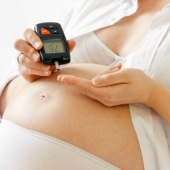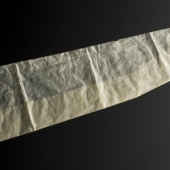When you're trying to conceive, the two-week wait between ovulation and your missed period can seem to stretch way beyond fourteen days. Many pregnancy tests now claim to be able to detect pregnancy two, three, or even four days before a missed period.
But there are some subtle sings to look for that may clue you into your pregnancy in the weeks before or after your missed period! If you're anxiously awaiting two pink lines, check out the very first pregnancy signs that might let you know a baby could be on the way.
Cramping or Spotting: Sometime between 6 and 12 days after sperm meets egg, the blastocyst attaches itself to the uterine wall. When this occurs a woman might feel mild cramping and may experience light spotting.
Elevated basal body temperature: Many women who are trying to conceive monitor their basal body temp by taking their temperature orally first thing in the morning. Basal body temperature usually increases slightly just after ovulation and remains elevated until the next period. If your nasal body temperature stays elevated for over two weeks, you may be pregnant.
Nausea: While morning sickness doesn't usually pick up until the 6-week mark, it's not uncommon to feel a bit queasy around the time of the missed period.
Increased heart rate: If you've got a fitness tracker, you might be able to see a small spike in your resting heart rate very early in pregnancy. Throughout pregnancy, a woman's blood volume increases significantly.
Tender breasts: Just as a woman may experience sore breasts in the days leading up to her period, she may experience tenderness or soreness in the very early days of pregnancy.
Bloating: Early in pregnancy (sometimes very early!), hormonal changes can lead to a slowing of the digestive system. This slowing can sometimes lead to some serious bloating in the soon-to-be mom.
Did you know you were pregnant before you had a missed period?
- 8085 views













